"Trademark Opposed? Defend It with Confidence — Corporate Verdict Has You Covered."
✅ Answer Trademark Opposition with Confidence — 100% Legal Assistance, 0% Bewilderment
Corporate Verdict assists startups, entrepreneurs, and businesses in defending their brand name when receiving a trademark opposition. Our seasoned legal professionals take care of the whole process of responding to opposition — from reading the notice to submitting your counterstatement — so you can maintain your focus on business while we ensure your brand gets protected.
🛡️ What You Receive When You Encounter a Trademark Opposition – With Corporate Verdict by Your Side:
✅ Thorough Examination of Opposition Notice by our trademark professionals
✅ Professional Drafting & Filing of Counter-Statement within 3–5 working days
✅ Customized Legal Strategy according to your trademark class, business nature, and case history
✅ Assistance in Evidence Submission, Affidavits & Documentation as per Registry requirements
✅ Hearing Preparation & Professional Representation before the Registrar of Trademarks (if necessary)
✅ Strict Schedules to prevent abandonment of your application
✅ Real-Time Tracking of Cases & Periodic Updates on opposition proceedings
✅ Free Legal Counsel on Brand Protection and future opposition handling

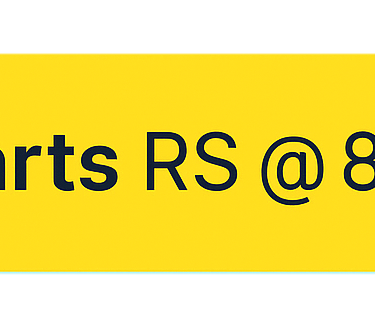
"Trademark Opposition Notice? Don’t Panic — Corporate Verdict is Here to Protect What You’ve Built."
⚖️ What is a Trademark Opposition in India?
A Trademark Opposition is an official legal protest lodged by a third party against the registration of a trademark, generally following its acceptance by the Trademark Registry and publication in the Trademark Journal.
This opposition is not invoked by the Registry itself (as would be the case for a trademark objection), but by another individual, company, or legal entity who feels that the suggested mark would infringe upon their existing rights or lead to public confusion.
✅ It is a valuable safeguard mechanism under Section 21 of the Trade Marks Act, 1999 of Indian trademark law to safeguard the rights of existing trademark owners.
✅ Reason for Filing a Trademark Opposition
You can file a trademark opposition to:
Stop registration of a *similar or identical** deceptively trademark * Prevent public confusion or dilution of an iconic mark. Guard *prior use rights** or unregistered marks according to common law. Oppose a mark that is *non-distinctive, generic, or descriptive**Prevent abuse of *geographical, cultural, or religious names**
How Does Trademark Opposition Work?
1. Journal Publication of Trademark:
The Registry receives the trademark application and publishes it in the Trademark Journal.
2. Notice of Opposition (Form TM-O):
Any third party may file an opposition within 4 months from the journal publication date.
3. Counter-Statement by Applicant:
The applicant is required to file a counter-statement within 2 months after receipt of the opposition. If this is not done, the application is abandoned.
4. Evidence Stage (Both Parties):
* Opponent files evidence in favor
* Applicant files evidence in reply
* Opponent can file evidence in reply (optional)
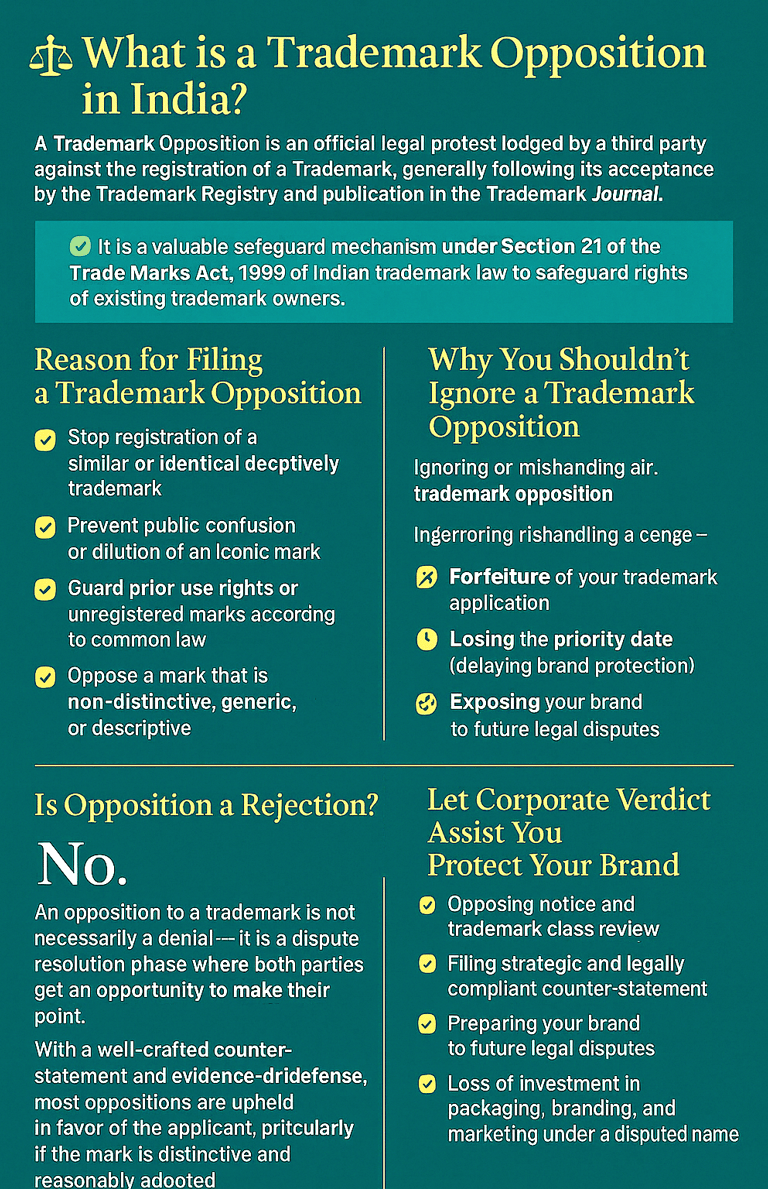

5. Hearing & Decision:
The hearing is arranged where both parties present their case. The Registrar then issues a finding to grant or deny the application.
❌ Is Opposition a Rejection?
No. An opposition to a trademark is not necessarily a denial — it is a dispute resolution phase where both parties get an opportunity to make their point.
With a well-crafted counter-statement and evidence-driven defense, most oppositions are upheld in favor of the applicant, particularly if the mark is distinctive and reasonably adopted.
Why You Shouldn't Ignore a Trademark Opposition
Ignoring or mishandling a trademark opposition may lead to: *Forfeiture** of your trademark application. *Losing the priority date** (delaying brand protection). *Exposing your brand** to future legal disputes. *Loss of investment** in packaging, branding, and marketing under a disputed name
📋 "What Are the Reasons Behind Trademark Opposition?"
1️⃣ Similarity to an Existing Trademark (Section 11)
If the trademark being used is deceptively similar or identical to an existing registered or unregistered mark, it can be opposed due to causing consumer confusion or association with another brand.
Example: "Pepsi" vs. "Pepzy" – the latter can be opposed due to similarity.
2️⃣ Prior Use by the Opponent (Common Law Rights)
An opponent can oppose even if he does not have a registered trademark, since Indian law also protects prior users under common law principles.
⏳ Priority in use takes precedence over priority in registration.
3️⃣ Lack of Distinctiveness (Section 9 – Absolute Grounds)
If the trademark is generic, descriptive, or too simple, it doesn't achieve the function of indicating the source of goods/services and can be opposed.
Example: Applying "Fresh" to a fruit juice company.
4️⃣ Chances of Public Deception or Confusion
A mark has the potential to lead consumers to think there's a link with an existing brand. This confusion – visual, sound, or concept – can be an acceptable reason for opposition.
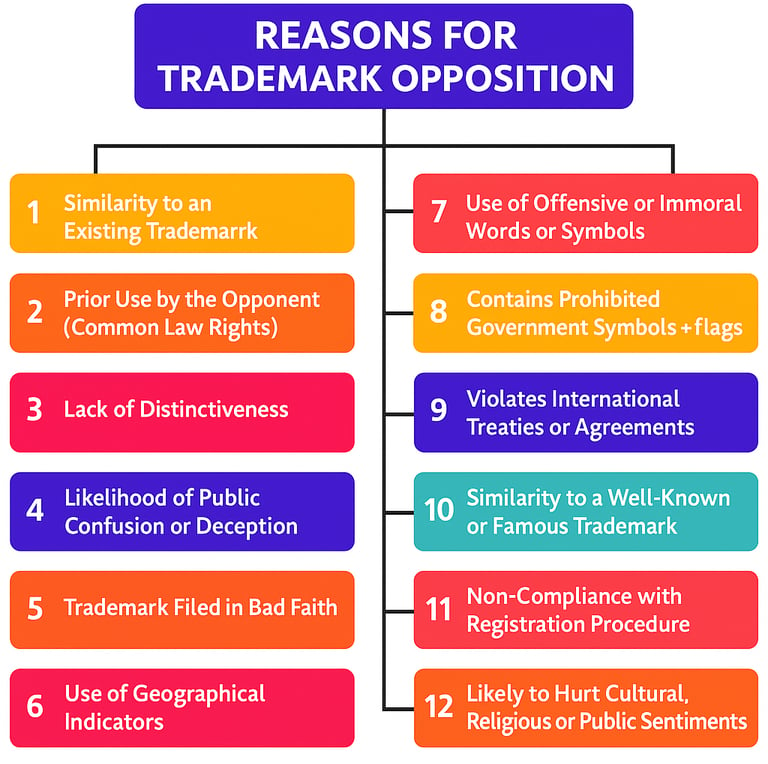

5️⃣ **Trademark Filed in Bad Faith
If the mark seems to be filed in bad faith, e.g., reproducing a competitor's name or domain squatting, it is a good ground for opposition.
Example: An ex-employee making a similar name to his company's business.
6️⃣ Trademark Has Geographical Indicators
Applying place names, region names, or GI tags (e.g., Darjeeling, Banarasi) without permission can invite opposition on grounds of abuse of public/geographic identifiers.
7️⃣ Offensive or Immoral Words or Symbols
Marks causing offense to religious sentiments, being obscene or against public morality can be opposed under absolute grounds for refusal.
8️⃣ Mark is Contrary to the Law or Prohibited by Emblems Act
If a mark makes use of government symbols, national flags, military insignia, or currency signs, it cannot be registered and can be opposed.
9️⃣ Prohibited Under International Agreements (e.g., Paris Convention)
Marks which infringe international obligations – e.g., abuse of names of international organizations (e.g., WHO, UNESCO) – are opposition grounds.
🔟Likeness to a Familiar or Renowned Trademark
Notwithstanding registration of the famous trademark in another class, opposition may be brought if use would dilute, tarnish, or unfairly capitalize on the goodwill of the renowned mark.
Example: "Google" as a shoe brand.
1️⃣1️⃣ Non-Compliance with Conditions for Registration
If the applicant has failed to file requisite documents, provided incorrect facts, or not complied with procedural compliance, the opposition can raise technical errors.
1️⃣2️⃣ Trademark Likely to Hurt Trade, Culture, or Sentiment
Names or logos that are sensitive to culture, cause religious or national feelings to be hurt, or cause discord in the public can be opposed in the public interest.
🧩 HOW CORPORATE VERDICT HELPS YOU RESPOND TO A TRADEMARK OPPOSITION
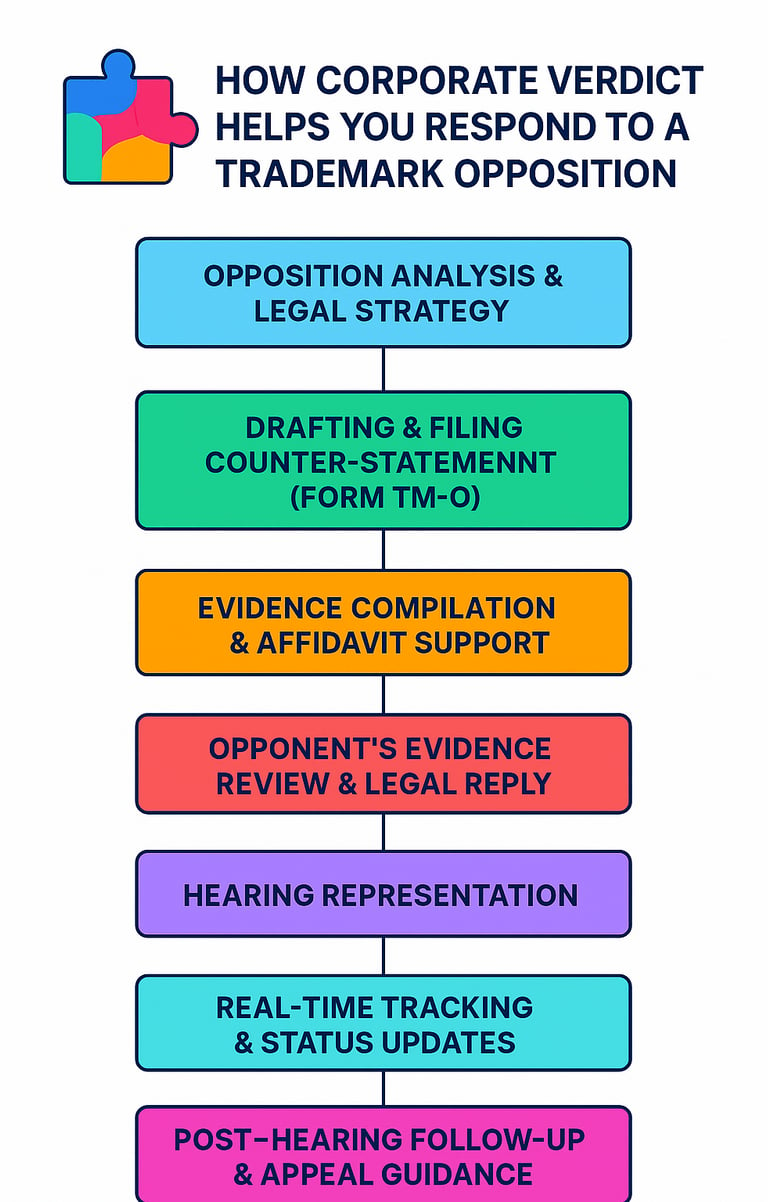

✅ 1. Opposition Analysis & Legal Strategy
We start with a comprehensive analysis of the Notice of Opposition, trademark class, opponent's assertion, and risk exposure — creating a customized legal strategy specific to your business and brand.
✅ 2. Drafting & Filing Counter-Statement (Form TM-O)
Our specialists draft a solid Counter-Statement within the 2-month statute of limitations — backed by legal justification, proof of use, and refuting spurious allegations.
Prompt and well-crafted reply prevents your application from being left in the cold.
✅ 3. Evidence Compilation & Affidavit Support
We assist you in assembling vital documents, proof of use, business presence, domain name records, and create affidavits that corroborate your ownership and bonafide use of the mark.
✅ 4. Review & Legal Response of Opponent's Evidence
Our lawyers scrutinize the opponent's evidence and draft your response affidavit backed with strategic counterarguments, documents, and legal arguments.
✅ 5. Hearing Representation
Corporate Verdict represents you in the opposition hearing before the Registrar — presenting arguments, removing doubts, and highlighting evidence.Our experienced lawyers ensure effective and professional representation.
✅ 6. Real-Time Tracking & Status Updates
We actively monitor your case and offer periodic updates to keep you informed of hearing schedules, submissions, and final orders.
✅ 7. Post-Hearing Follow-up & Appeal Guidance
If necessary, we help you with post-hearing submissions, analysis of Registrar's decisions, or filing of appeals before the Intellectual Property Appellate Board (IPAB) or High Court.
🤝 Why Choose Corporate Verdict for Your OPC Registration?
At Corporate Verdict, we don't simply process forms — we defend your brand identity as if it were our own.
✅ Here's why top startups, SMEs, and corporates choose us:
1️⃣ Expert Legal Drafting
We prepare accurate, legally valid counter-statements and evidence submissions as per the Trade Marks Act, 1999 and concerned case laws.
2️⃣ Full Case Management
From examining the notice of opposition to making replies, evidence, and appearing on your behalf in hearings — we do it all.
3️⃣ Strong Success History
Our IP lawyers and trademark specialists have effectively managed 100+ opposition cases in various industries.
4️⃣ Proper Deadline Handling
We monitor each milestone date — publication, reply date filing, deadline for evidence — to guarantee no lapse or penalty.
5️⃣ Tailored Legal Approach
Each opposition is unique. We create customized strategies according to your mark's history of use, class, and opponent's position.
6️⃣ Reasonable & Transparent Pricing
No surcharges. Fixed packages with transparent scope — whether you're opposing or defending an opposition.
7️⃣ PAN India Reach supported Online
Wherever you are in India, our team offers remote end-to-end service — opposition filing to final hearing.
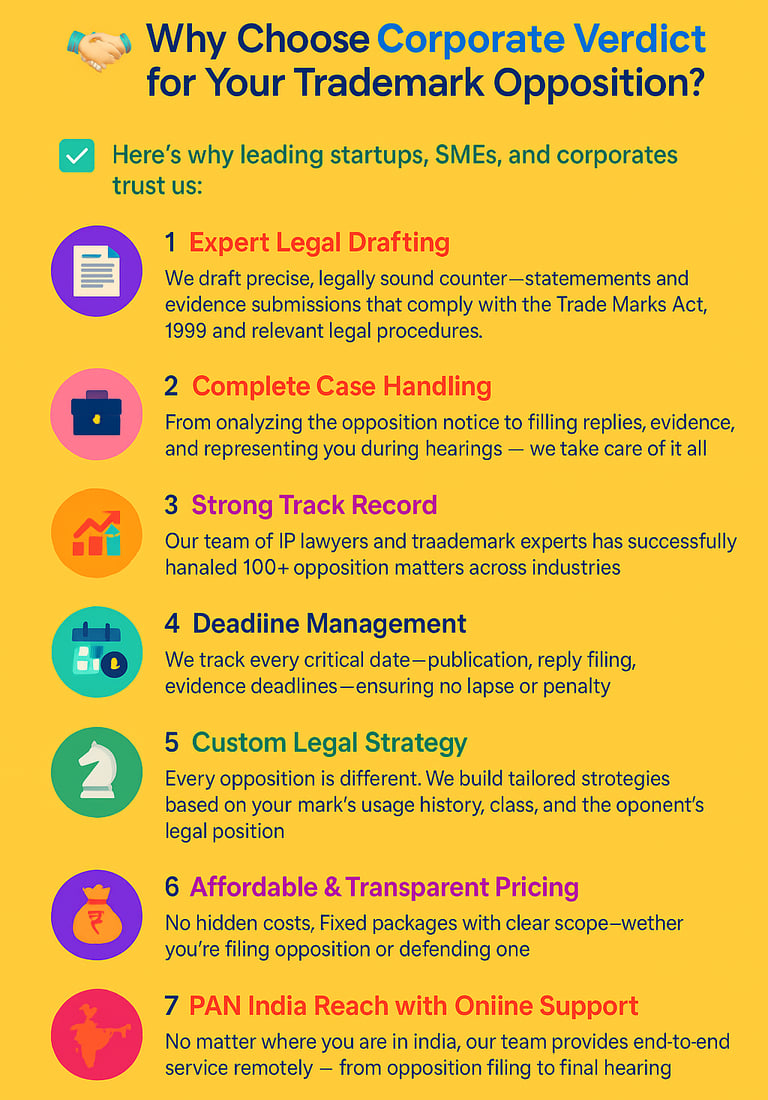

Contact us Now !
Get in touch
Have questions or need help with business registration, legal compliance, or corporate services?
Feel free to reach out to us:
📞 Call or WhatsApp: +91-7303632352
📧 Email: info@corporateverdict
